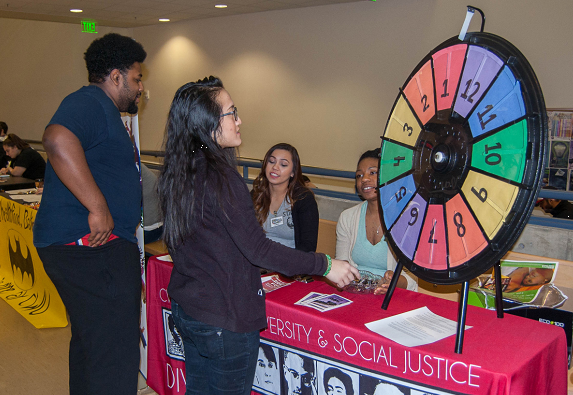Feminists at Central fight negative connotation
March 5, 2015
The “‘F’ word,” which, contrary to popular belief means feminism, is not a new issue for the team at the Center for Diversity and Social Justice (CDSJ), but their SURC 253-originated campaign “Take Back the ‘F’ Word” is still rather fresh and has big aspirations of being an inspiration. The CDSJ started getting the ‘F’ word out there last quarter with informative posters across campus and has now begun tabling.
In late February, members of both CDSJ and the Central Feminist Club set up a table complete with a trivia wheel, facts about current forms of inequality and F-emblazoned buttons designed by the graphic designers at the CDSJ.
Senior graphic design major, Lex Leighty, believes awareness of the feminist cause is especially crucial on college campuses.
“I think it’s important [for college students to talk about feminism], because I feel like our generation, we’re getting into the point where we’re becoming leaders in society and we really need to lead by example,” Leighty said.
Taylor Boteilho, sophomore specialized studies in global affairs major, also says she thinks college is a prime time to address issues like the stigma of the ‘F’ word.
“It is true that when you’re in college and you’re in classes you’re learning new things and your brain is really active and you’re with a lot of different peers you wouldn’t have met anywhere else,” Botheilo said. “It’s a really special community, a college campus is, and there’s a lot of power to change. Students have a lot more power than they know.”
Some people, like Jose Hernandez, senior law and justice and sociology major, don’t figure out that what they’ve been writing off as just general social justice beliefs is feminism until they get into the world of higher education.
“When I found out what feminism really stood for I said ‘wow, I’ve been a feminist [for] a very long, I didn’t know this because of the negative connotation that comes with that word.’ So I guess I was a feminist and I didn’t know it.”
Similarly, Feminist Club faculty advisor and assistant professor of sociology, Dr. Pam McMullin-Messier, said in an email that she didn’t actually identify herself as a feminist until she was in grad school.
“Taking back the F-word is just one step towards empowerment and self-actualization and realizing that it can mean many things in terms of diversity and inclusivity for a variety of experiences and opportunities; feminism doesn’t mean the same thing for everyone nor should we expect it to be a one size fits all perspective,” McMullin-Messier said.
According to CDSJ student programmer Casie McCoskeys the “Take Back the ‘F’ Word,” campaign is about making feminism accessible to people. Feminism is not solely about issues of gender, but can encompass issues of race and sexuality. This inclusive aspect of feminism is referred to as “intersectionality” within the feminist movement.
The idea that a woman’s race, not only her gender, would affect her pay is an example of intersectionality.
“They’re not seeing that there’s more that comes together in the idea of a feminist than just their gender,” Leighty said.
Josh Osborn, CDSJ office aide, Feminist Club senator and senior sociology and political science major, sees importance not only in explaining what issues fall under the feminism umbrella, but in dissuading the stigma associated with the ‘F’ word.
“Feminism is about more than simply taking from men to give to women,” Osborn said. “If anything Take Back the ‘F’ Word is meant to be a transitional program to help us look towards the future of feminism and how feminists can adapt in order to meet the demands of society in a post-modern age.”


